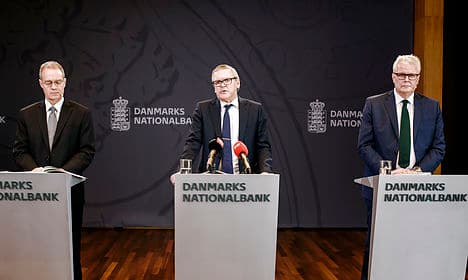Central bank upgrades Danish growth outlook

Denmark’s central bank, Nationalbanken, has surprisingly upgraded its expectations for economic growth and revealed that the majority of the pressure on the Danish krone came from domestic investors.
Nationalbanken said on Wednesday that it is now predicting Denmark’s GDP to grow by 2.0 percent this year, a 0.3 percent increase over its projections from December. The growth forecast for 2016 meanwhile was marginally upgraded to 2.1 percent.
“Growth is stimulated by the continued fall in oil prices, lower interest rates and a weaker effective krone rate. Each of these three factors contributes to boosting the economy,” a statement from the bank read.
Nationalbanken said that the drop in oil prices would not lead to deflation in Denmark, despite the concerns raised when consumer prices dropped in January for the first time since 1954.
“The falls in oil prices seen in previous months will not lead to actual deflation in Denmark, i.e. to general and sustained price falls. While the lower oil prices do curb inflation here and now, the overall effect will be positive for the Danish economy,” Nationalbanken wrote.
In its statement, the central bank also revealed that the massive pressure applied to the krone in mid-January largely came from domestic sources.
“Danmarks Nationalbank’s compilation shows that almost two thirds of the inflow of foreign capital – and the resultant purchases of Danish kroner in both January and February – came from domestic institutional investors, including pension and insurance companies, while non-resident investors accounted for just over one third,” the bank wrote.
After Switzerland decided to abandon its ties to the euro in mid-January, speculators aggressively turned their attention to the Danish krone. In response, Nationalbanken cut interest rates four times in a span of less than three weeks.
The approach seems to have put the speculators on retreat, as several said that they have given up on buying out the krone.
In its statement Wednesday, the bank once again stressed that Denmark would not follow Switzerland’s lead.
“There is one very significant difference between Denmark and Switzerland: the Swiss National Bankcentral bank had has made it clear that the ceiling vis-à-vis the euro was a temporary measure. In contrast, Denmark has conducted a fixed exchange rate policy for decades, first against the D-mark, then against the euro. This policy enjoys broad support in the Danish society and from political parties across the Folketing (parliament),” the bank wrote.
Comments
See Also
Nationalbanken said on Wednesday that it is now predicting Denmark’s GDP to grow by 2.0 percent this year, a 0.3 percent increase over its projections from December. The growth forecast for 2016 meanwhile was marginally upgraded to 2.1 percent.
“Growth is stimulated by the continued fall in oil prices, lower interest rates and a weaker effective krone rate. Each of these three factors contributes to boosting the economy,” a statement from the bank read.
Nationalbanken said that the drop in oil prices would not lead to deflation in Denmark, despite the concerns raised when consumer prices dropped in January for the first time since 1954.
“The falls in oil prices seen in previous months will not lead to actual deflation in Denmark, i.e. to general and sustained price falls. While the lower oil prices do curb inflation here and now, the overall effect will be positive for the Danish economy,” Nationalbanken wrote.
In its statement, the central bank also revealed that the massive pressure applied to the krone in mid-January largely came from domestic sources.
“Danmarks Nationalbank’s compilation shows that almost two thirds of the inflow of foreign capital – and the resultant purchases of Danish kroner in both January and February – came from domestic institutional investors, including pension and insurance companies, while non-resident investors accounted for just over one third,” the bank wrote.
After Switzerland decided to abandon its ties to the euro in mid-January, speculators aggressively turned their attention to the Danish krone. In response, Nationalbanken cut interest rates four times in a span of less than three weeks.
The approach seems to have put the speculators on retreat, as several said that they have given up on buying out the krone.
In its statement Wednesday, the bank once again stressed that Denmark would not follow Switzerland’s lead.
“There is one very significant difference between Denmark and Switzerland: the Swiss National Bankcentral bank had has made it clear that the ceiling vis-à-vis the euro was a temporary measure. In contrast, Denmark has conducted a fixed exchange rate policy for decades, first against the D-mark, then against the euro. This policy enjoys broad support in the Danish society and from political parties across the Folketing (parliament),” the bank wrote.
Join the conversation in our comments section below. Share your own views and experience and if you have a question or suggestion for our journalists then email us at [email protected].
Please keep comments civil, constructive and on topic – and make sure to read our terms of use before getting involved.
Please log in here to leave a comment.